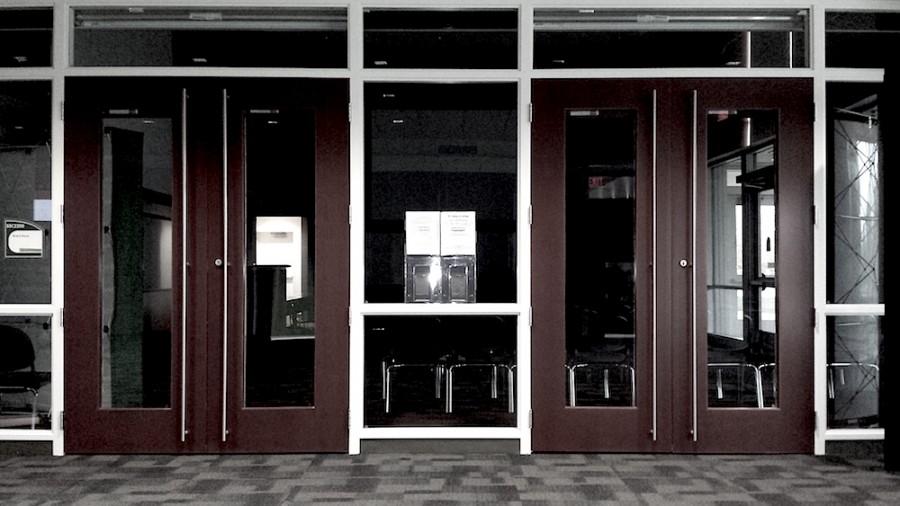Board Wars: The Administration Strikes Back
In row over college’s finances, the administration needs to be even more transparent
The entrance to the board of trustees meeting room in the Student Services Center.
Cue scrolling text.
A short time ago, in a board room very, very close…it is a period of civil war. Rebel Tea Partiers, striking with accusations of hidden expenses and sketchy accounting, have embarrassed the administration, and by extension the college.
Open The Books Illinois, an outgrowth of conservative PAC For the Good of Illinois, has had their eyes focused on the College of DuPage since earlier this year. They recently released a 500-page document, detailing a number of “hidden expenses” not approved by the board. Included are such damning accounts as: Office Depot, Sodexo and Computer Discount Warehouse. Oh, and us. Yes, friends, The Courier is on the list.
But what does this list actually mean? At the board meeting last week, the financial affairs department broke it down for us.
The payments are normal expenses. Most of them are entirely uncontroversial. The reason they are classified as such is for efficiency’s sake; it wouldn’t make sense for the board to approve of every $100 transaction made. This is standard practice for governments the size of the college. Nothing sketchy here.
Some of the payments are more than $15,000? That’s because multiple payments to the same vendor, each less than the $15,000 cap, have been combined into a single check for convenience’s sake. This seems a bit less intuitive, but it makes sense if you think about several different subgroups in the bureaucracy purchasing things from the same vendor. Think of it like a parent buying lunch for their two kids. Each kid orders separately, but the parent pays for it all at once.
Then we get to the weird stuff. Over $243,000 spent on wine and alcohol, designated as instructional supplies. $23,000 to a shooting club for President Breuder. The sketch-dar is going off. What’s going on here?
The “instructional supplies” thing seems laughable, but Lynn Saptya, COD’s financial controller, wrote the concerns off, stating that the college didn’t have a food and beverage account set up. The alcohol is presumably used in the culinary management program, as well as the Waterleaf restaurant on campus. It does seem like a lot, but keep in mind much of it is resold- it isn’t sitting in a cabinet in Breuder’s office.
The shooting club membership can also be explained. It is used as an off-campus meeting site. The college pays for it, and Breuder takes people there for meetings, actually doing college business. This is apparently standard practice for community colleges. Most in the area have a country club membership of some kind. It seems like an unnecessary expense, given the quality of the public golf courses in the area that seem like they could serve a similar purpose, but that is an entirely different conversation.
The problem with all of this is that it’s so complicated. Accounting at an institution such as the college is, believe it or not, difficult. There is a massive amount of money moving into, and out of this place, and as such it seems like a special amount of oversight is required. It also appears that this oversight already exists. We can talk about whether or not the school should be spending money like this, but that is a different conversation than questioning if it is allowed to.
The arguments presented by critics of the school are especially effective because they are simple. It is far easier to understand and digest “they’re stealing our money” than it is to really understand what’s going on. Their arguments also gain steam emotionally. We just saw a picture of our president standing on an endangered species that he shot plastered all over the internet, and now we hear the college is paying for his shooting club? Something doesn’t seem right about that at a gut level.
The core issue is one of perception. Whether or not the administration has done anything wrong, it certainly feels like they have. Students around campus are taking note in increasing numbers. The stories have run on several national-level news sites.
At the Oct. 16 board of trustees meeting, the administration showed some teeth in systematically dismantling these accusations. Their job is not done, however. If they want to regain the perception of legitimacy, they must redouble their efforts to be both transparent and to explain the rationale behind their decisions when it comes to spending money. The Tea Party is winning the war of public opinion, it would seem, even if they’re wrong.









Vikaas Shanker • Oct 24, 2014 at 11:30 am
First of all, if you actually read what the conventional and unconventional media is writing about, you’ll realize the question of “if the college should be spending money” is being asked. This editorial is really the one piece focusing on if the college should be allowed to spend it. You’ve fallen into the college’s historic track of distorting history, from destroying the last remnants of what this paper used to be, to attempting to shift the conversation by defending a point that no one really, truly cares about.
Second, if you want to write an editorial that attempts to justify your college administration’s spending amid the incredible allegations, please go farther than taking the college’s word for it. FOIA the crap out of every “college-related” expense, including those off campus meetings. Who was Breuder meeting? For how long? What type of merlot or chardonnay and how much did each person in the meetings drink? FOIA the breakdown of every single alcoholic dollar, and find out exactly where each bottle of $100 wine went, and where it was used. Request all records associated to the satellite phones Breuder took on his hunting trips, including call logs. This is ALL public record, and the Freedom of Information Act is the reason why all this financial misconduct was uncovered.
Third, I remember not getting the administration’s perspective as much as I should have when I was leading stories about the administration as the Courier’s editor in 2010-2011. But I still asked the tough questions and dropped stories that had no merit AFTER I called the necessary parties involved. I’ve noticed in your coverage this year, you’re doing the complete opposite. Rather than ask them tough questions, you’re being reactive reporters. Please shore up, because you may be a college newspaper, but decades of student reporters before you have given the Courier a good reputation and name, pretty much all it has left. Don’t destroy that. Ask the tough questions. Don’t be intimidated by this administration.